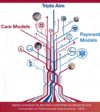Click to read complete article
Published on Patient Centered Primary Care Collaborative
(http://www.pcpcc.net)
Introduction
The Patient-Centered Medical Home (PCMH) is an approach to providing comprehensive primary care
for children, youth and adults. The PCMH is a health care setting that facilitates partnerships
between individual patients, and their personal physicians, and when appropriate, the patient’s
family.
The AAP, AAFP, ACP, and AOA, representing approximately 333,000 physicians, have developed the
following joint principles to describe the characteristics of the PCMH.
Principles
- Personal physician – each patient has an ongoing relationship with a personal physician trained to
provide first contact, continuous and comprehensive care. - Physician directed medical practice – the personal physician leads a team of individuals at the
practice level who collectively take responsibility for the ongoing care of patients. - Whole person orientation – the personal physician is responsible for providing for all the patient’s
health care needs or taking responsibility for appropriately arranging care with other qualified
professionals. This includes care for all stages of life; acute care, chronic care, preventive services,
and end of life care. - Care is coordinated and/or integrated across all elements of the complex health care system
(e.g., subspecialty care, hospitals, home health agencies, nursing homes) and the patient’s
community (e.g., family, public and private community-based services). Care is facilitated by
registries, information technology, health information exchange, and other means to assure that
patients get the indicated care when and where they need and want it in a culturally and
linguistically appropriate manner. - Quality and safety are hallmarks of the medical home.
To read the complete article, click on the link: Joint Principles


